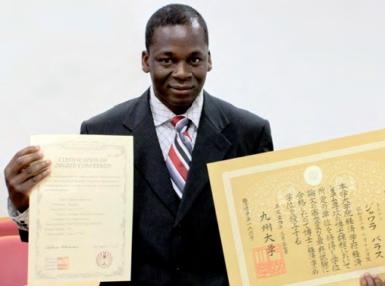
Interview with Barassou Diawara, a beneficiary of an ACBF-supported higher learning program
Kindly give us a brief background of yourself?
I work as a Knowledge and Learning Officer at the African Capacity Building Foundation. I am from Senegal. At the ACBF, among other tasks, I support the production of the Africa Capacity Report which is the flagship publication of the Foundation, measuring and assessing capacities in relation to the development agenda of African countries. I also assist in the activities of the Policy Institutes Committee and the Strategic Studies Group initiatives. The PIC is a network of ACBF-supported policy institutes and think tanks created to foster knowledge and experience-sharing in the management of think tanks and policy issues facing African countries. The SSG is a strategic network of the Foundation made up of global knowledge experts from various institutions that assists in identifying key policy and emerging issues requiring the attention of ACBF and its stakeholders. I hold a Master’s degree in Economics from Cheikh Anta Diop University in Senegal, and a Ph.D. in Economics from Kyushu University in Japan, where I was also a research fellow before joining the ACBF.
How did you benefit from ACBF funding?
From 2002 to 2004, I benefited from an ACBF training program called the Programme de Troisième Cycle Interuniversitaire en Economie (the Interuniversity Graduate Program in Economics). The PTCI is an ACBF-funded program which promotes through competition the training of high-level economists, in order to make them internationally competitive and directly operational. The program operates through five campuses in Francophone African countries: in Ouagadougou (Burkina Faso), Dakar (Senegal), Abidjan (Cote d’Ivoire), Libreville (Gabon) and Yaoundé (Cameroon). Studying at the Dakar campus, the program helped me to earn my Master’s degree in Economics with specialization in Applied Macroeconomics in March 2005. The Program fully financed my participation in the Common Campus for Specialized Courses held in Niamey (Niger) in 2004. The CCCO is a set of advanced courses offered at the CCCO designed to meet international scientific standards, taking into account the most recent advances in the discipline of economics. Every course is divided into two parts: one taught by a Professor from an advanced country and the other by a Professor from a developing country.
How has that changed your capacity as a professional?
The ACBF-funded program has changed my capacity in at least two ways. First, it has given me a very strong background in economics, enabling me to understand the dynamics of African and world economics with strong analytical skills. Second, thanks to the program, I became internationally competitive. Right after completing the Master’s program, I was able to get a scholarship from the Japanese government to continue my studies in Japan and work in an international environment without any problem. An important and interesting outcome of the program is that it has strengthened my network throughout the continent in the sense that during the period I was able to meet and build a strong relationship with 92 students from 15 African countries. Now I have a professional and working relationship with all of them in their respective countries.
In your opinion, what are some of the urgent capacity needs for upcoming professionals in Africa?
The urgent capacity needs for individuals remain education and training and research which underline the capacity to tackle issues such as employment, structural transformation of the economies of Africa and regional integration, and allow people to understand the issues and take the required actions in a timely manner. Secondly, a conducive environment with relatively good incentives so that professionals can be retained and stay innovative and competitive. I am very glad that the ACBF is paying attention to both issues, namely through its various training programs and via the Africa Capacity Report which assesses capacity in relation to the development agenda in African countries.
How should the ACBF through its partners address the urgent capacity needs?
Through its partners, the ACBF needs to firstly continue to financially support the institutions it helped to create because some of them may not able to function and deliver without ACBF grants. Secondly, creating think tanks and training programs where needed, given the Foundation’s good understanding of the capacity development landscape and the development agenda of the continent, and thirdly, providing technical assistance to key actors and bodies across the continent and a platform to share its over 20 years’ experience in the field of capacity development and allow peer-learning.
Your parting shot?
I would like to express my gratitude to the Foundation for giving me the opportunity to get a world-class training, and to discover and face the world with confidence.





